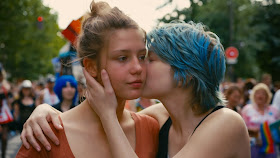Practically everywhere you looked, 2013’s cinema seemed to be full of characters hitting the road: whether in search of a mythical lottery win (Nebraska), a solution to a family mystery (Ida), an escape from an environment none too supportive of cross-generational gay sex (Gerontophilia), a Grandfather (Side By Side), or simply some horny hitchhikers to do VERY BAD THINGS to (Under the Skin). While no one movie moved me quite as deeply as the one that topped my list last year (see here), there’s no disputing that 2013 added up to an extremely rich and varied film year. From the sweet transgression of LaBruce’s gorgeous, funny romance to the existential chill of Glazer’s haunting mix of sci-fi poetics and grit-Brit realism, from the utterly immersive epic intimacy of Blue is the Warmest Colour to the beguiling between-blockbuster diversion of Whedon’s Much Ado About Nothing, here’s my Top 15.
Under the Skin (dir. Jonathan Glazer) Our world through alien eyes as Scarlett Johansson’s extra-terrestrial abandons her mysterious mission to take a walk on the human side for a while. Glazer’s Lynch-via-Loach opus gets precisely where its title indicates. Full review here.
Blue is the Warmest Colour (dir. Abdellatif Kechiche) The sex scenes got the headlines, but what mattered most in Kechiche’s three hour exercise in empathy was the movie’s absolute rapt absorption in everyday pains and pleasures and how those add up to form the developing weave of a life, and a consciousness. Essential.
Gerontophilia (dir. Bruce LaBruce) As tender as it is transgressive, LaBruce’s hilarious and heartbreaking take on a teenage boy’s erotic fixation on the elderly was a highlight of my time at the Toronto Film Festival, and deserves to get UK distribution ASAP. (Are you listening Peccadillo Pics?)Full review here.
Ida (dir. Pawel Pawlikowski) Pawlikowski’s return to Poland resulted in his finest feature yet in this character study about a road trip undertaken by a young girl about to take holy orders and her wayward aunt. Working from a surprisingly astute script by Rebecca Lenkiewicz, the movie conjours 60s Poland's commie drabness via sublime black-and-white images and nuanced performances from its two leads.
Bertolucci on Bertolucci (dir. Luca Guadagnino) With no voiceover and barely a clip, Luca Guadagnino’s exhilarating talk-fest doc elegantly pieces together interviews with Bernardo Bertolucci to form an absorbing tapestry of the director’s career that takes him from handsome young poet to wheelchair-bound, but still active, elder statesman. Bravo.
Night Moves (dir. Kelly Reichardt) Reichardt’s eco-thriller-as-morality-play has more overt narrative drive than her earlier features without losing any of their subtlety or attention to nuance.
InRealLife (dir. Beeban Kidron) Funny, frightening and moving by turns, Kidron’s doc overcame questionable directorial decisions (Rizzle Kicks on the soundtrack, anyone?) to become an urgent yet non-hectoring exploration of the effect of the Internet on our brains, attention spans and interpersonal relationships. Full review here.
Wadjda (dir. Haifaa Al Mansour) Or, The Kid Without A Bike. Al Mansour’s lovely, humane movie spins from its intimate portrait of a teenage girl’s desire for a bicycle a wider portrait of women’s position in Saudi society. Full review here.
B For Boy (dir. Chika Anadu) A Dardennes influence is also apparent in Chika Anadu's excellent debut feature in which a pregnant Nigerian woman, under pressure to produce a male child, resorts to desperate measures when she loses the baby. Like Al Mansour’s movie, Anadu's uses a low-key, relatable, realist framework to gesture towards a wider social picture, drawing the viewer into the protagonist’s dilemma without recourse to speech-making or histrionics.
Bastards (dir. Claire Denis) Denis’s impeccably brooding and enigmatic revenge drama is one of her bleakest, most troubling works. The first film I saw at TIFF, it proved one of the hardest to shake off. Full review here.
Gravity (dir. Alfonso Cuarón) If Sam Beckett and Jim Cameron had teamed up on a project it’s possible that the result would have been something like this. Full review here.
Stranger By The Lake (dir. Alain Guiraudie) Evoking Denis and Ozon at their finest, Guiraudie's tranquil but taut cruising resort thriller manages to be funny, disturbing and sexy-as-hell by turns. Full review here.
Much Ado About Nothing (dir. Joss Whedon) So here’s to more director’s between-blockbuster diversions.
Frances Ha (dir. Noah Baumbach) “This apartment is very aware of itself,” announces one character in Frances Ha. The same might be said for Noah Baumbach’s super-self-conscious study of late 20-something directionlessness in which the interactions are arch and the best bit a steal from Leos Carax. Still, Frances Ha earns itself a place on the list because it’s fun to see a US movie making some overtures to French film for a change, and because Greta Gerwig’s performance is grating and great all at once. And also because I had the pleasure of seeing the movie on a July weekend that turned out to be one of the happiest weekends I spent in 2013. Sometimes, it’s not just the movie, but what happens around the time you see the movie, that counts.
Honourable mentions: Stoker (dir. Park Chan-wook), What Maisie Knew (dir. Scott McGehee, David Siegel), A Story of Children and Film (dir. Mark Cousins), As I Lay Dying (dir. James Franco), Saving Mr. Banks (dir. John Lee Hancock), Violette (dir. Martin Provost), Abuse of Weakness (dir. Catherine Breillat)
Late to the party: Beasts of the Southern Wild, Barbara, Lincoln, Yossi.
Disappointments, duds: Philomena (dir. Stephen Frears), Adore (dir. Anne Fontaine), Young and Beautiful (dir. Francois Ozon), A Late Quartet (dir. Yaron Zilberman).









































